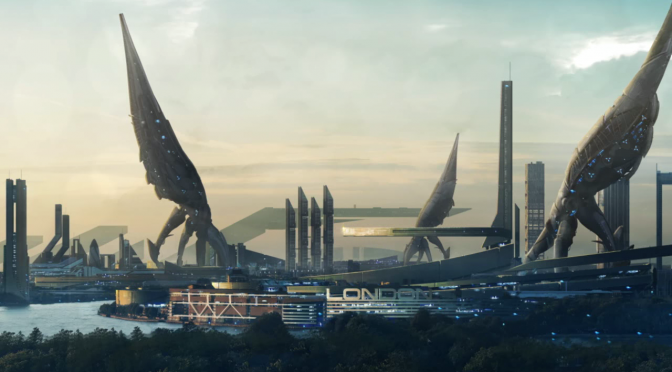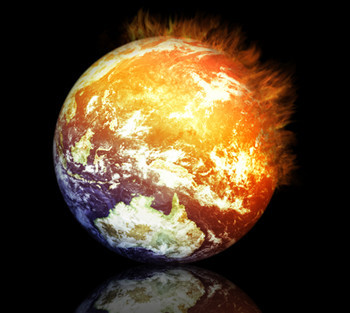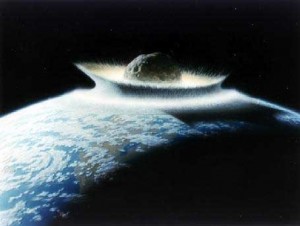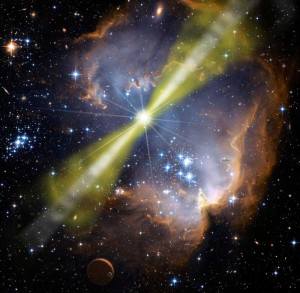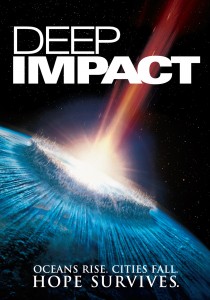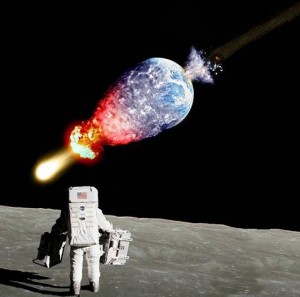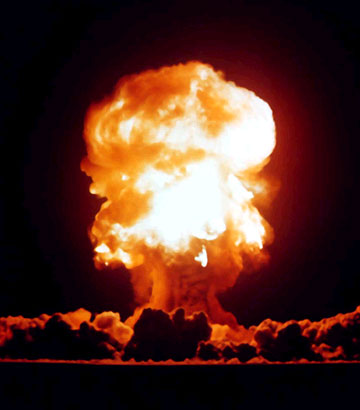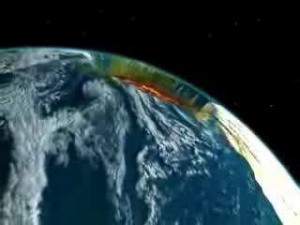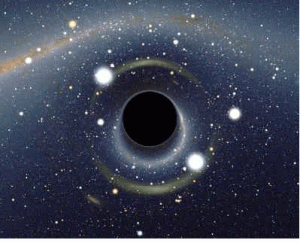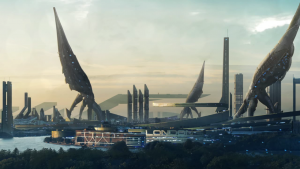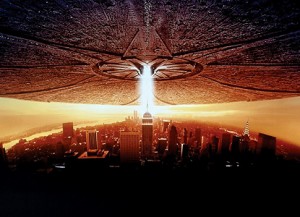So for a while I’ve been talking about the Fermi Paradox and the different scenarios at play in what may have happened and what may be happening. Thinking about it in depth is a good practice for scifi writers because it makes minor changes to the general scifi space story. There’s a chance we could be the big dogs in the universe, there’s also a chance that there are a lot of alien civilizations out there but the effort of colonization is restrictive. Both of these present interesting concepts to work with, most of them setting up the idea that first contact would have us being the invaders (even if accidentally).
But it would be dishonest to discuss the Fermi Paradox without talking about the elephant in the room. There’s a chance that, not only does the Great Filter exist, but we haven’t run into it yet. I don’t subscribe to the theory much myself, for reasons I’ll list as we go, but the possibility is still quite real. For a lot of people this tends to be doom and gloom, but for me?
Well, it’s not like I’d survive it, so at least I could take some inspiration from the possibilities.
Cosmic Judgment Day
With the universe being as quiet as it is (so far) and our natural attraction to the apocalypse scenario, a lot of people think the Filter, if it exists, is ahead of us. It’s true that there are a lot of forces in this universe we’d be pretty powerless to stop, sometimes including ourselves. But the real issue with trying to discuss the Great Filter is something I brought up when I first started the series – we really don’t know what it is (which is, of course, why we don’t know whether it’s in our future or past).
But there are some fairly common and common-sense theories as to what it might be. And each of these happens to present a fairly logical argument that shouldn’t be discounted. By the same token, each of them presents possibilities that a lot of people who subscribe to the Filter theory don’t usually consider but are incredibly good sources of stories for us crazy fiction writers.
So, with that in mind, let’s go ahead and get the most common one out of the way…
Natural Disaster
We’ve seen this scenario play out in our films, books, and imaginations for as long as we’ve known the vast scope of space. Story after story of the asteroid that comes hurtling for the Earth and takes us out in a great devastating fireball followed by years of winter from the thick cloud cover. And, of course, the idea is generally that we could fend it off with some nuclear device (perhaps one delivered by blue collared heroes portrayed by Bruce Willis). But we all know, deep down, that it’s not as easy as the movies make it out to be. Surely, this is something that could take us out and end it all. It’s just too big, a celestial body laughing off our efforts. And, frighteningly enough, it’s not the most powerful thing out there.
Rogue stars, passing black holes, mega flares from our own sun – all of these could end us without a problem. And we’re painfully aware of this, waiting for the shoe to drop and all of this around us to end in the blink of an eye. In fact, some things out there are barreling towards us already and most of the public isn’t even really aware of it. For instance, gamma ray bursts are a potential end-times scenario for life – a powerful explosion of energy directed like a bullet through the cosmos as a star dies, a literal death-ray that would scorch life from the surface of the Earth in an instant. Terrifying, right?
Here’s the really scary part: there’s a chance we may be hit by one someday.
Gamma Ray Bursts require very specific stars, and not many of those happen to exist in our galaxy, but they still happen rather frequently in the universe. If one happened too close or happened to be pointed our way… game over. The fact of the matter is, even if we were among the most advanced civilizations possible, nothing could conceivably stop the power of a burst. In fact, one hitting us head on would simply burn the atmosphere off the planet and leave everything else in ashes.
Damn.
Maybe Not
The problem with this one is that it requires us to have all of our eggs in one basket. The very act of colonizing other planets will progressively reduce the chances a single natural disaster could erase us from the cosmos. Avoiding extinction by asteroid is as simple as getting our asses to Mars. Avoiding extinction by Gamma Ray Burst is a little harder – we’d need to be in another solar system. But the very act of doing this will nullify the chances a natural disaster could eliminate us entirely. In other words, if this is the great filter, it only has a couple centuries to get us before it’s rendered moot.
And, for that matter, you have to also remember that we got where we are today by surviving 5 previous mass extinctions. In fact, we wouldn’t even be here today if it weren’t for that. One could argue this means the Great Filter is behind us, but it is just as easy to argue that this means natural disasters aren’t the magic bullet that suddenly puts an end to life. If that were the case, this wouldn’t be the Filter we’re looking for.
But What If…?
However, let’s go ahead and imagine that these disasters are so common that life tends to get wiped out before it can hit that colonization stage. Sure, we’re only a hair’s breadth away from this stage ourselves (in astronomical time), but it could be that we’re just incredibly lucky so far (or managed to survive it). But what about when it happens -after- something reaches that point?
Imagine now the kind of things that would happen to a colony on Mars or in another star system if Earth suddenly died. In fact, imagine that this is what happens often. How many alien civilizations have gone quiet because all that’s left are the scraps? How many are out there wandering the stars as refugees, hoping to find somewhere to land? How many ships full of sleeping aliens are drifting through space until their automated ships can find a planet they can live on?
It’s already a concept played with by the Syfy series Defiance, and it just explores one path of many. In Defiance the alien races came to Earth because their system was dying and they didn’t realize our planet was populated until they got here. This could be a story that happens often, combined with finding struggling civilizations existing on asteroids, ancient derelicts populated by the very last survivors of a once great civilization. Perhaps, that could even be something that happens to us.
And of course, it’s just as (if not more) likely they ended up that way because of…
Unnatural Disasters
This is the other most common belief about what the Filter might be. The general idea is that, eventually, we’re going to blow ourselves away and that all sentient life is destined to do so. Mind you, we’ve already got the ability to do it as we speak but, for the most part, we’re terrified of the possibility.
Nuclear weapons are the obvious theory, with the possibility of Mutually Assured Destruction decimating the planet and bringing about nuclear winter. But besides that there’s also the possibility of climate change, biological warfare, and a science project run amok. The Large Hadron Collider terrified people for a while as it was about to be turned on. The public thought it could do anything from generate strange matter to a small black hole and all of these were potential ways to see our planet eliminated.
But more than that is the fear that something we think we want in the future is going to be the thing that gets us. What if anti-matter reactions can go out of control? What if Warp Drive causes singularities to form? What if some new power source, artificial intelligence, or genetic engineering grow beyond our control and leave devastation in their wake?
Maybe Not
Only, once again, this assumes it happens before colonization begins. The act of destroying a single planet is rendered moot if people aren’t sitting on that planet. And it can be safe to assume that any level of technology that is established before the colonization process, while dangerous, is going to be put in check by the general fear of what they can do.
It’s certainly true that we can’t assume alien civilizations think like we do, but survival tends to be something that needs to be on the mind of a species if it’s going to get beyond that first few millennia. The human race is fairly war-like, all things considered, yet we’ve gone over half a century without wiping ourselves off the face of the planet with an onslaught of simultaneous mushroom clouds. It’s certainly true that another development in the future just might pull it off for us, but that’s generally going into the kind of technological advancement that would either leave a trail (the robot apocalypse would probably be pretty noisy radio-wise) or would happen probably after we’ve started to colonize at least one other place (it’s far more likely we’ll land on Mars before we have warp drive).
And, frankly, we’re a little too down on ourselves and a little too assured that everything else will behave like us. It’s true that we’re likely to do some stupid things along the way, but it’s also just as true that the smartest among us are generally cautious about what they’ve got. If something had even the potential of destroying the planet, it would be unlikely that the person working on it would be carrying out the experiment right here where it could actually do the most damage.
I mean, assuming it’s not built out of someone’s garage…
But What If…?
But, okay, let’s assume it was built out of someone’s garage and the world ended with a bang as some dumb ass opened a wormhole in his parent’s house. We’d all die in a blaze of glory, but there’s a good chance something would be left behind. See, when we picture something destroying the planet we tend to picture it a little too extreme. Yes, we’re all going to be dead, but that doesn’t necessarily mean the solar system goes with us.
For instance, say we happened to accidentally create a black hole large enough to start accumulating mass from the area around it. A lot of people picture this ending our solar system entirely because..that’s what black holes do, right?
But no, it wouldn’t. In fact, it would just create a gravity well of the same kind as our own Earth. Meaning once it was done, there would still be satellites orbiting this singularity, and the moon, and it would be orbiting the sun and occasionally get hit by asteroids and comets. Essentially, while its density would be infinite, its mass would be limited to the Earth and thus, it wouldn’t change the layout of our solar system much at all. That would be one hell of a mess for someone to discover.
The same would hold true for most of the major self-destructive things we could produce. Each and every one of them would leave something bizarre behind for another civilization to discover. The strange matter would likely leave a planet full of strange matter. The Anti-matter would probably generate one hell of a radiation burst. The warp drive would probably leave space a weird and bizarre thing. And the robots? Well…
Cosmic Watchdogs
Now here’s a Great Filter employed probably the most successfully by the acclaimed Mass Effect series. This is the idea that civilizations rise and fall constantly, culled as they reach a certain point in their development by a more advanced race existing just out of view and waiting to see a new civilization crop up and snuffing them out once they do.
This is basically the old trope of alien invasion with a new angle. What if they aren’t just attacking us for something we have but seriously to get rid of us before we can develop beyond a certain point? It goes without saying that it would explain why we never hear other civilizations out there – they’re destroyed once someone can detect them. But then…some questions arise.
Maybe Not
Like, the most important question of all, why?
Sure, there are a lot of reasons to go and conquer another planet. But a lot of those reasons happen to apply to all sorts of celestial bodies. Resources can be found almost everywhere and several are much more common on uninhabited planetoids. Hydrogen is far more common in gas giants than here on Earth, and those can be found anywhere. Gold? There’s an asteroid full of the stuff within our own planet. Water? You can make that with oxygen, hydrogen, and a flame.
Really, the idea that it would ever be over resources in something as vast as our galaxy would be a little silly. One of the biggest descriptive factors in judging a civilization’s development is how they’re using their resources and what resources they’re capable of using. We’re so low on the totem pole there that any civilization that would want to eliminate us doesn’t really need what we have anymore.
But What If…?
Except, perhaps, living space. One of the things I mentioned in the previous entry was that there were a lot of really ugly rocks to every somewhat comfortable one out there. While a sufficiently advanced culture would have an easy time getting raw materials and chemicals out of the universe, the act of finding a planet with the right temperature and gravity would be a real pain in the ass under most circumstances and wouldn’t be worth your wild in most cases. Perhaps you could bulk up a planet to get some extra mass on it, but that would likely screw up its orbit in the process.
So actual colonization would be a long, tedious process of looking at every single star system and picking out which ones happen to have rocks you could work with. They’d need to have the right orbit, the right size, and the right composition for you to even consider terraforming. You’d want something economical because, let’s face it, it’s not worth it if you’re firing your people off at a lifeless star system just to die. So you’d be sitting there, watching, waiting, and finding that it’s something of a wild goose chase..
That is, of course, until one of them happens to broadcast it’s location to you. It’s entirely possible that such a civilization just patiently waits for someone to signal to them that they’re out there. We may figure we just send out friendly greetings, but we’re also sending out the fact that we’re living on a temperate planet with liquid water and sufficiently stable landmass to support our civilization. If you were to listen to the heavens and found such a signal, you’d become aware of a new cushy rock in the cosmos to land on. In which case…
It’s go time.
(I write novels. I also have a twitter account. I’m sure both of these will be left on some hard drive once our planet is covered in ashes.)


